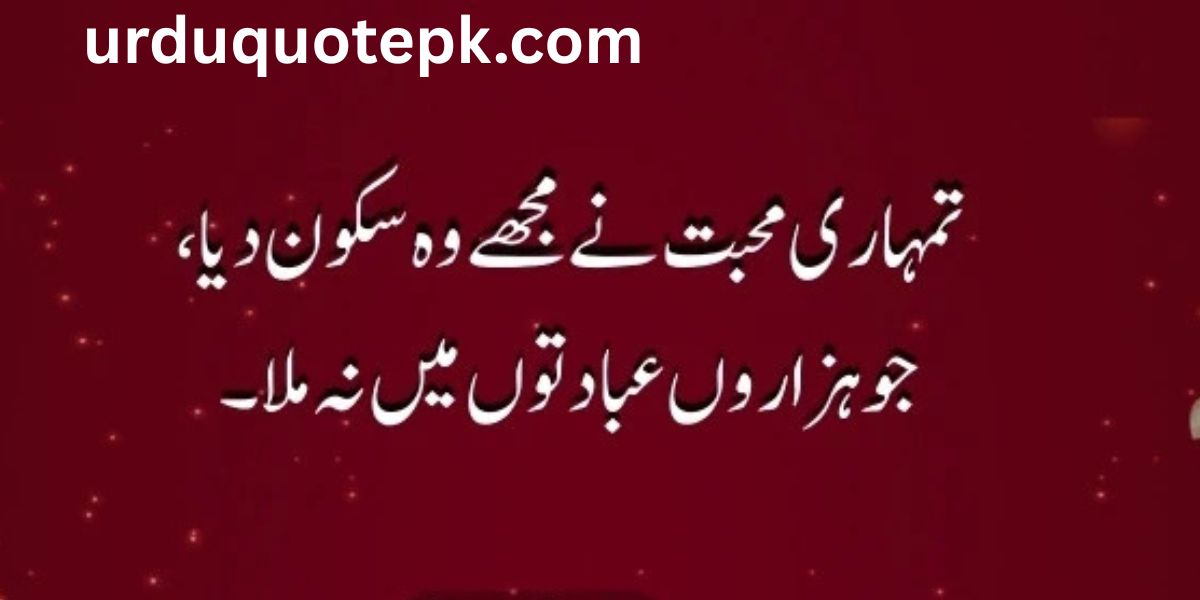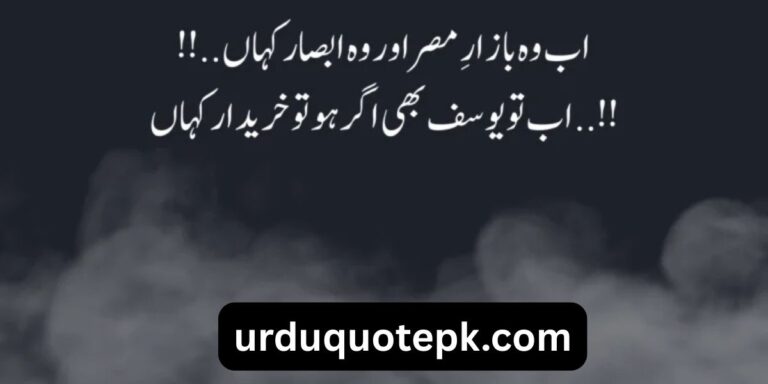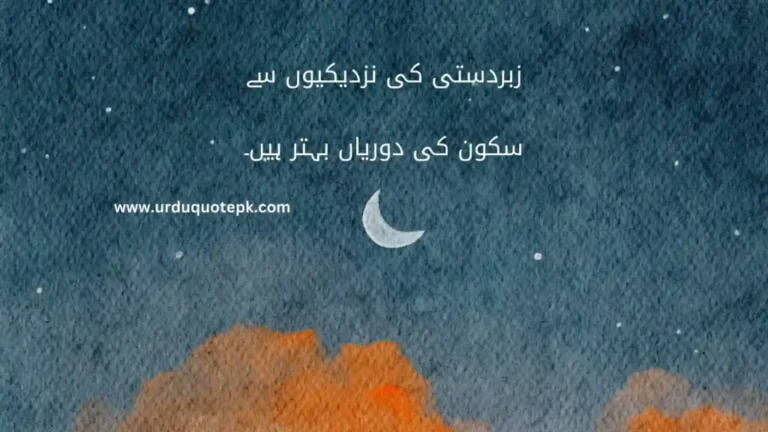Best 20 Sad Urdu Shayari 2025 | Deep & Touching Emotions
Do you feel a heavy heart, weighed down by sadness that lingers like a shadow? Are you lost in thoughts that make your soul ache, yearning for someone or something gone? You’re not alone in this. These emotions are part of being human, and words can be a gentle companion to express what feels unspeakable.
Here, we present 20 soul-stirring sad Urdu shayari, shared by you, to capture the essence of longing, heartbreak, and silent pain. Each verse is a mirror to your emotions, a friend that understands without judgment. Share these poignant lines with loved ones or keep them close as a reminder that even in sorrow, there’s beauty.
Table of Contents
- Top Sad Urdu Shayari
- Conclusion
Top Sad Urdu Shayari
Below are the heartfelt shayari you provided, written with their transliteration, English translation, and a brief reflection on their emotional depth, paired with aesthetic imagery to enhance their mood.
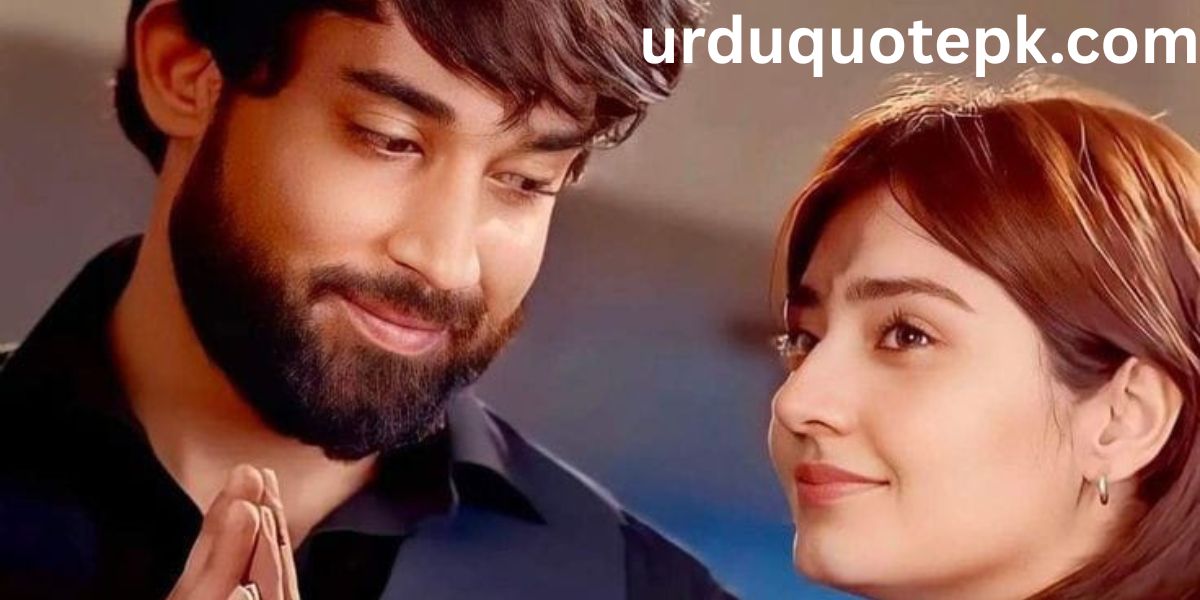
ہوئی مدت کہ تیری دید کو ترسی آنکھیں
ضبط جیسا بھی ہو، کون اتنا صبر کرتا ہے
اور تیرے ہجر کے مارے ہوئے بیماروں پر
نسخہ لقمان بھی ہو، پھر کہاں اثر کرتا ہے
Hui muddat ke teri deed ko tarsi aankhein
Zabt jaisa bhi ho, kaun itna sabr karta hai
Aur tere hijr ke maare hue bimaaron par
Nuskha Luqman bhi ho, phir kahaan asar karta hai
Translation:
It’s been ages since my eyes yearned for your sight,
No matter the restraint, who can endure such patience?
And for those wounded by your absence,
Even Luqman’s remedy would fail to heal.
Reflection:
This shayari captures the unbearable longing for someone whose absence feels eternal. It speaks of a heart that waits endlessly, knowing no cure can soothe the pain of separation.
Aesthetic Image: A lone figure gazing at a distant horizon under a twilight sky, with stars just beginning to appear.
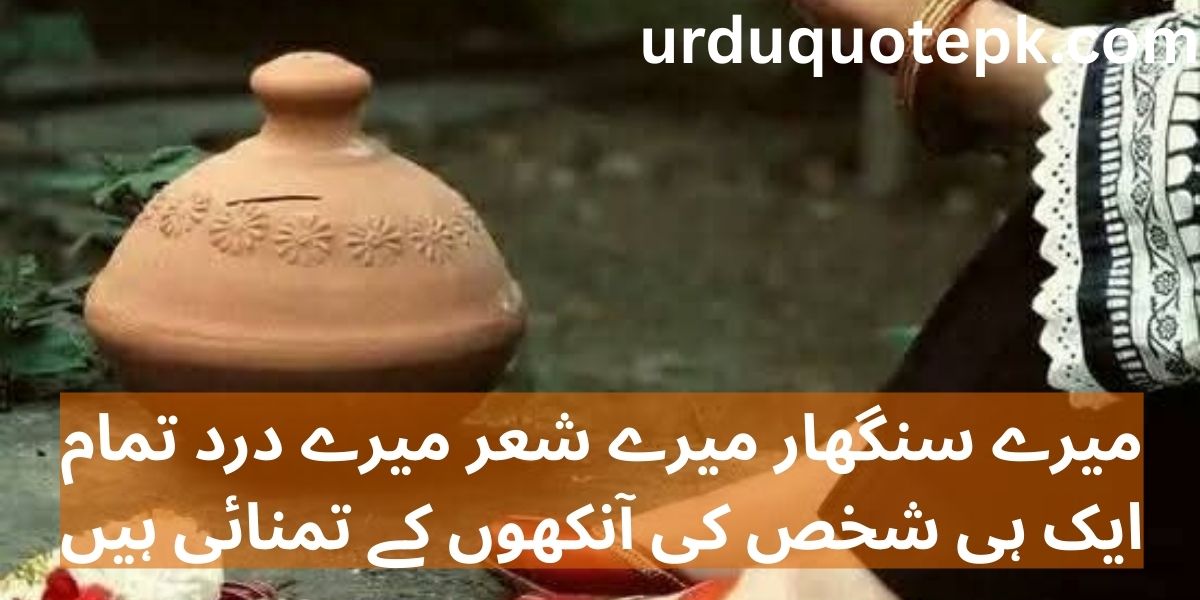
میرے سنگھار میرے شعر میرے درد تمام
ایک ہی شخص کی آنکھوں کے تمنائی ہیں
Mere singhaar, mere she’r, mere dard tamaam
Ek hi shakhs ki aankhon ke tamannai hain
Translation:
My adornments, my poetry, my every pain,
All are desires for the eyes of one person.
Reflection:
This verse reflects devotion so deep that every aspect of the self—beauty, art, and sorrow—exists only for one beloved. It’s a poignant confession of love’s consuming nature.
Aesthetic Image: A delicate rose resting on an open poetry book, bathed in soft candlelight.
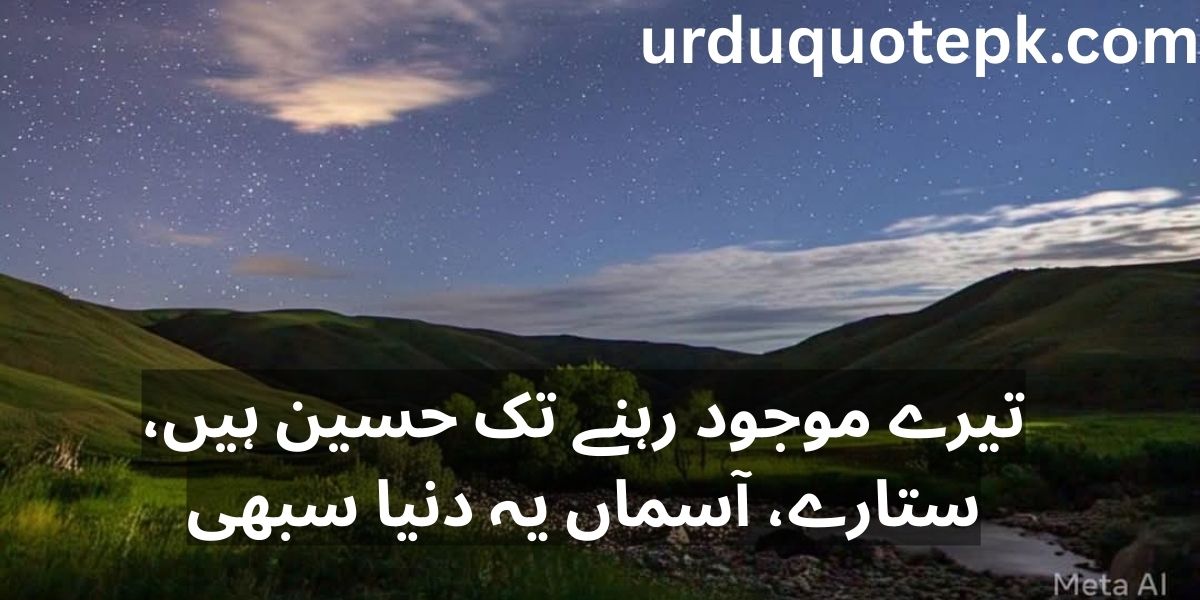
تیرے موجود رہنے تک حسین ہیں، ستارے، آسماں یہ دنیا سبھی
Tere maujood rehne tak haseen hain, sitare, aasman, yeh duniya sabhi
Translation:
As long as you’re here, the stars, the sky, this entire world is beautiful.
Reflection:
This shayari conveys how one person’s presence can transform the world into a place of wonder, hinting at the emptiness that follows their absence.
Aesthetic Image: A starry night sky reflecting on a calm lake, with a silhouette standing by the shore.
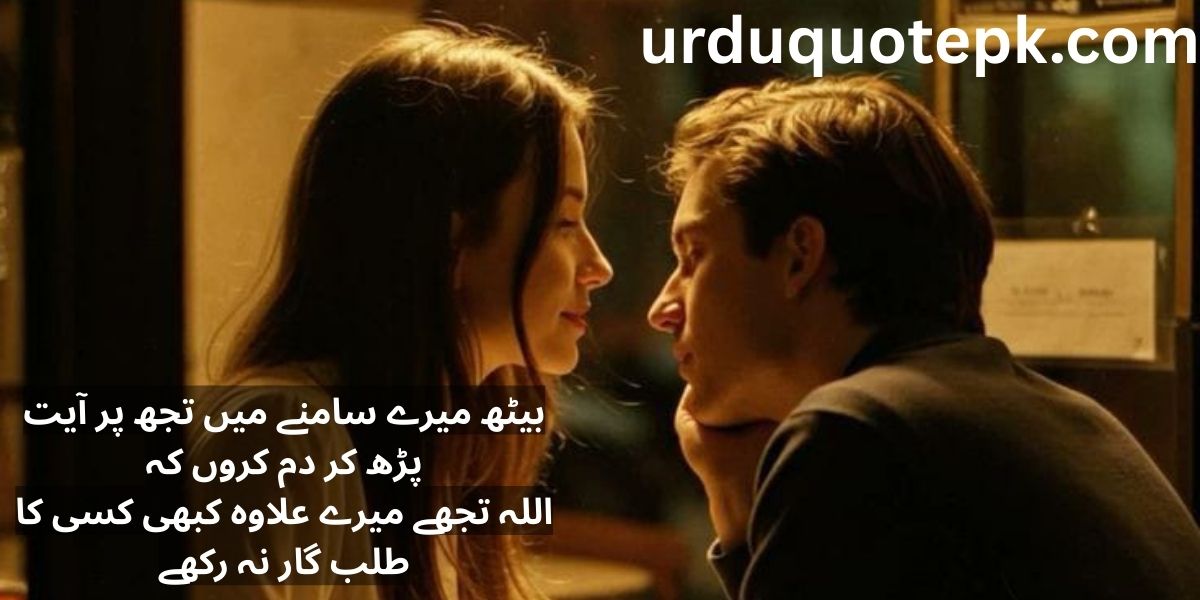
بیٹھ میرے سامنے میں تجھ پر آیت پڑھ کر دم کروں کہ
اللہ تجھے میرے علاوہ کبھی کسی کا طلب گار نہ رکھے
Baith mere saamne, main tujh par aayat padh kar dam karoon ke
Allah tujhe mere ilawa kabhi kisi ka talabgaar na rakhe
Translation:
Sit before me, let me recite verses and pray over you,
May Allah never make you yearn for anyone but me.
Reflection:
A tender yet possessive plea, this shayari blends love with a spiritual wish, revealing the fear of losing someone to another’s heart.
Aesthetic Image: A glowing lantern casting light on an open Quran, with rose petals scattered around.
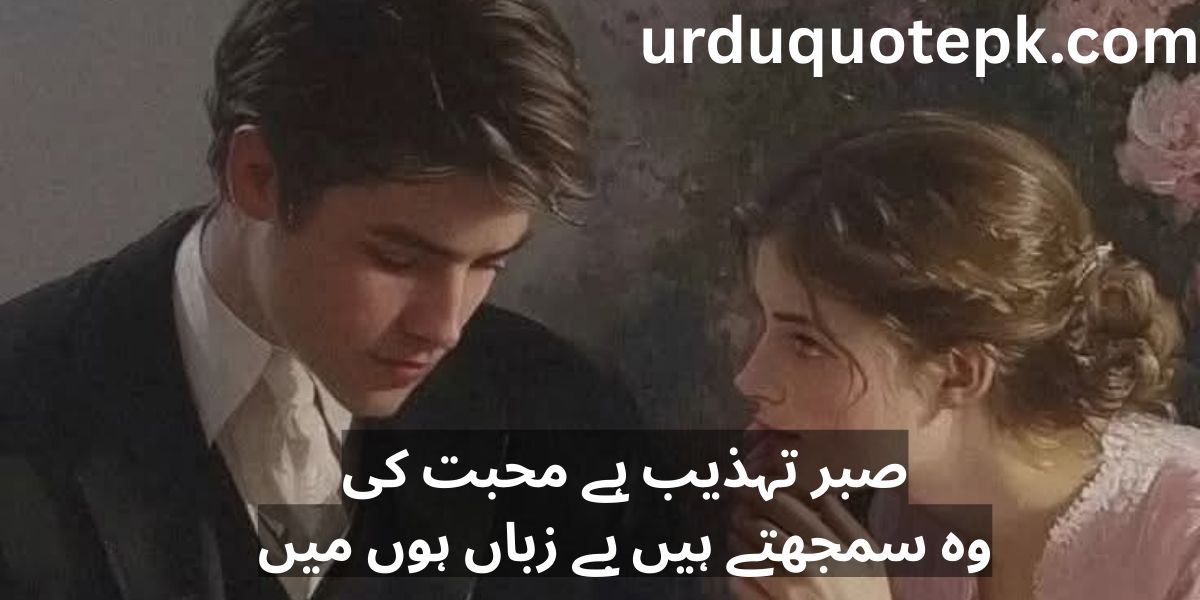
صبر تہذیب ہے محبت کی
وہ سمجھتے ہیں بے زباں ہوں میں
Sabr tehzeeb hai mohabbat ki
Woh samajhte hain be-zabaan hoon main
Translation:
Patience is the grace of love,
But they think I’m merely voiceless.
Reflection:
This verse speaks to the quiet dignity of enduring love’s trials, mistaken by others as weakness or silence. It’s a cry for understanding.
Aesthetic Image: A single white lily standing tall in a quiet garden at dawn.
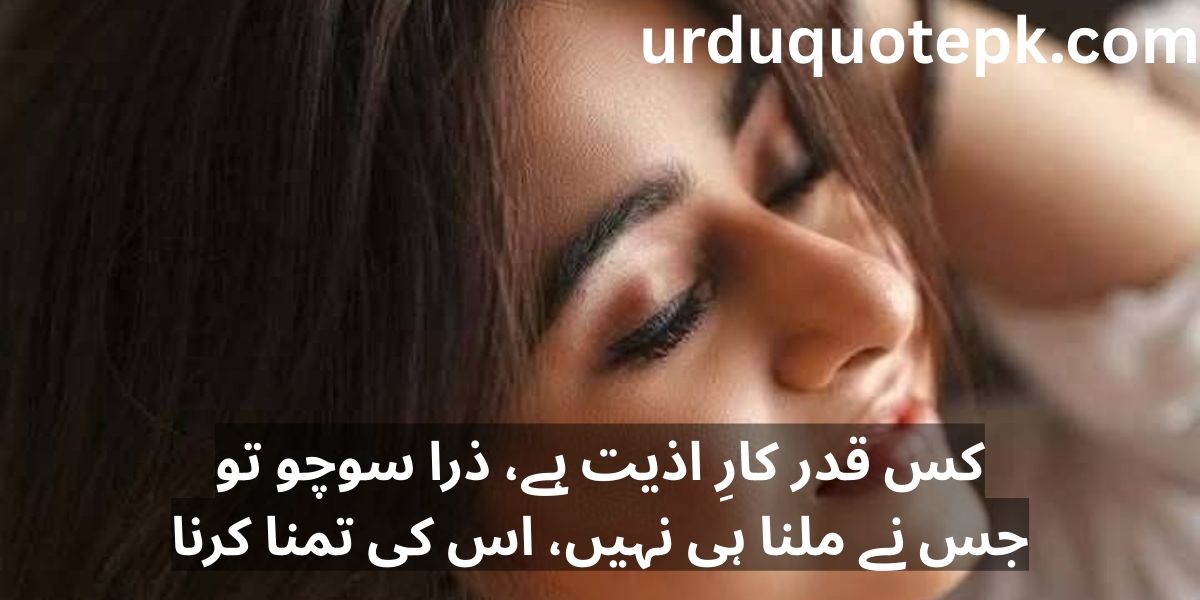
کس قدر کارِ اذیت ہے، ذرا سوچو تو
جس نے ملنا ہی نہیں، اس کی تمنا کرنا
Kis qadar kaar-e-azeeyat hai, zara socho to
Jis ne milna hi nahi, us ki tamanna karna
Translation:
How torturous it is, just think,
To desire someone who will never be yours.
Reflection:
This shayari captures the agony of yearning for the unattainable, a love that exists only in dreams and brings endless pain.
Aesthetic Image: A barren tree under a gray sky, its branches reaching out to nothing.
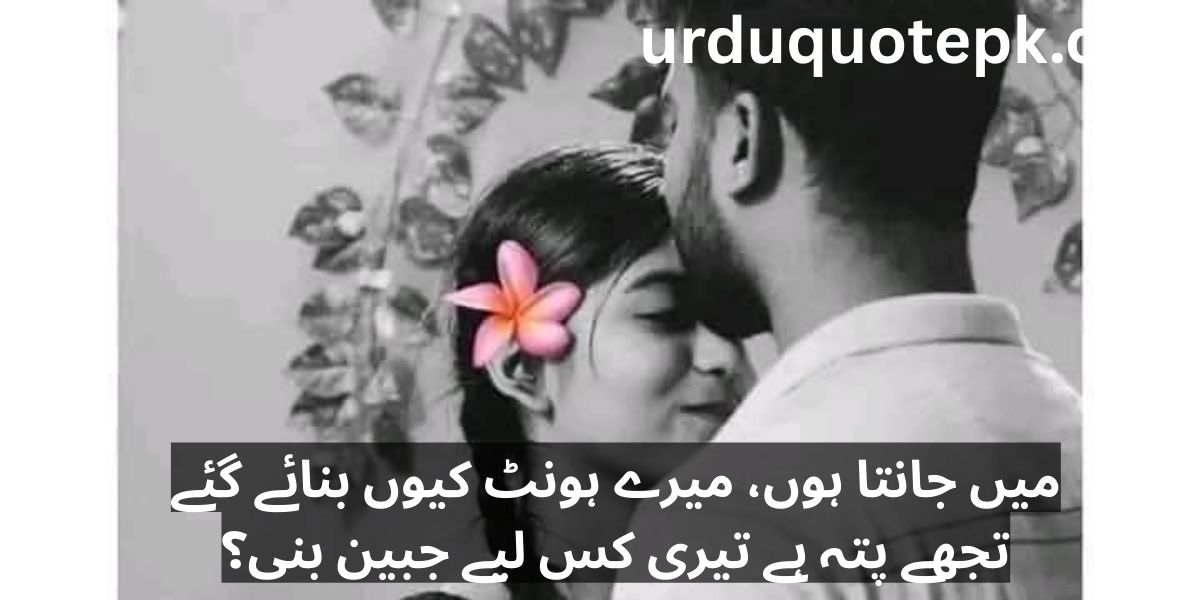
میں جانتا ہوں، میرے ہونٹ کیوں بنائے گئے
تجھے پتہ ہے تیری کس لیے جبین بنی؟
Main jaanta hoon, mere hont kyun banaye gaye
Tujhe pata hai teri kis liye jabeen bani?
Translation:
I know why my lips were made,
Do you know why your forehead was crafted?
Reflection:
A playful yet melancholic question, this shayari hints at an intimate connection where each part of the beloved holds a purpose, now lost in separation.
Aesthetic Image: A close-up of a delicate hand holding a mirror reflecting a wistful face.
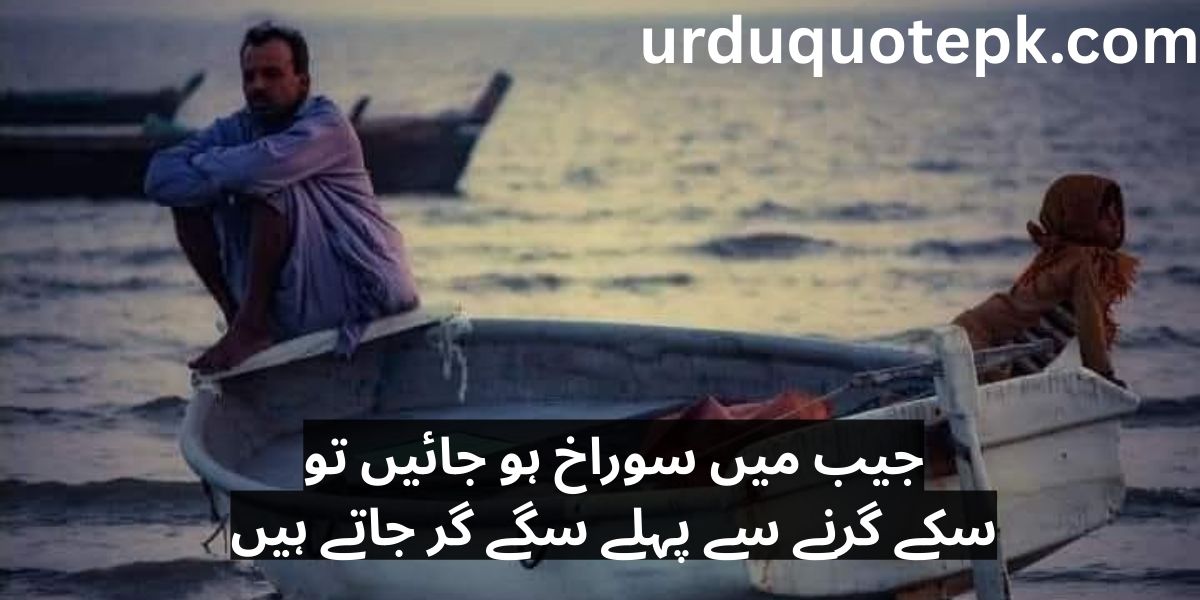
جیب میں سوراخ ہو جائیں تو
سکے گرنے سے پہلے سگے گر جاتے ہیں
Jeb mein suraakh ho jayein to
Sikkay girne se pehle sagay gir jate hain
Translation:
When there’s a hole in your pocket,
Kin fall away before coins do.
Reflection:
This shayari bitterly reflects on betrayal, where those closest to you abandon you in times of hardship, revealing their true nature.
Aesthetic Image: A torn pocket with coins spilling onto a dusty road.
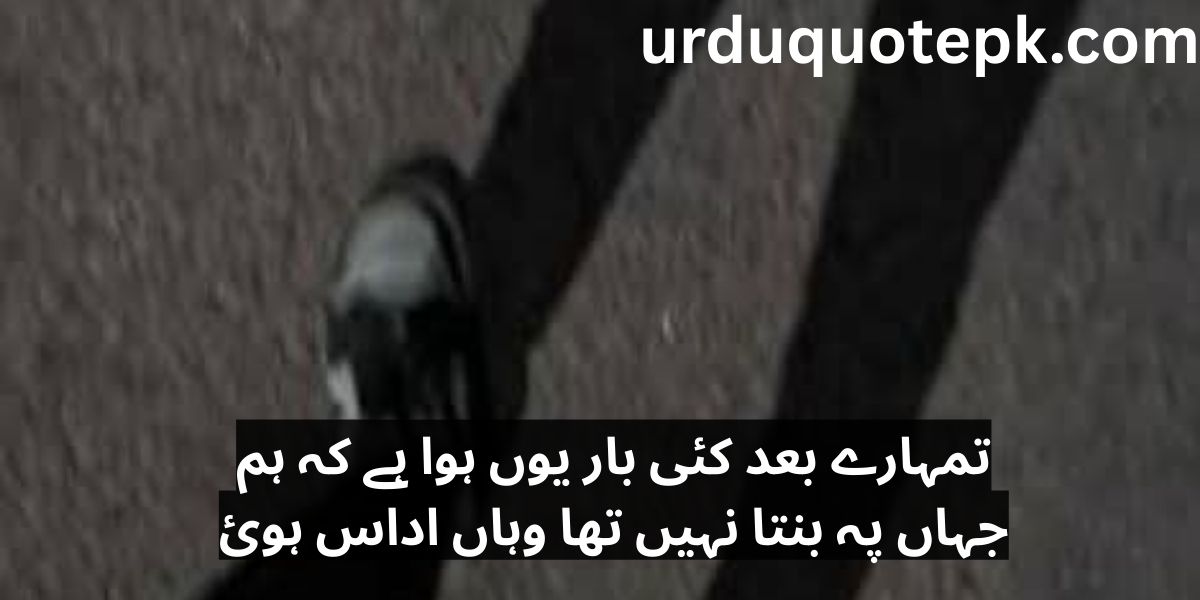
تمہارے بعد کئی بار یوں ہوا ہے کہ ہم
جہاں پہ بنتا نہیں تھا وہاں اداس ہوئے
Transliteration:
Tumhare baad kai baar yun hua hai ke hum
Jahan pe banta nahi tha wahan udaas hue
Translation:
After you left, it’s happened many times,
We grew sad in places where it didn’t make sense.
Reflection:
This verse captures the randomness of grief, where the absence of a loved one casts sorrow over even the most unlikely moments.
Aesthetic Image: A crowded marketplace with one figure standing still, lost in thought.
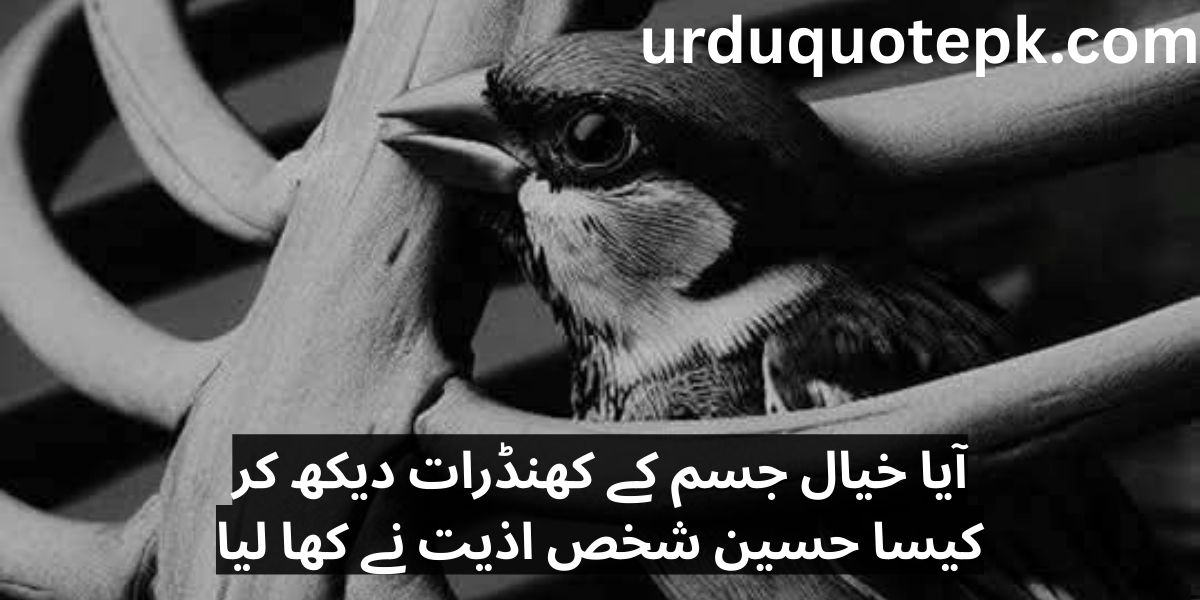
آیا خیال جسم کے کھنڈرات دیکھ کر
کیسا حسین شخص اذیت نے کھا لیا
Aaya khayaal jism ke khandaraat dekh kar
Kaisa haseen shakhs azeeyat ne kha liya
Translation:
The thought came, seeing the ruins of this body,
What a beautiful person suffering has devoured.
Reflection:
A haunting reflection on how pain can erode even the most vibrant soul, leaving behind a shell of what once was.
Aesthetic Image: A cracked mirror reflecting a faded portrait.
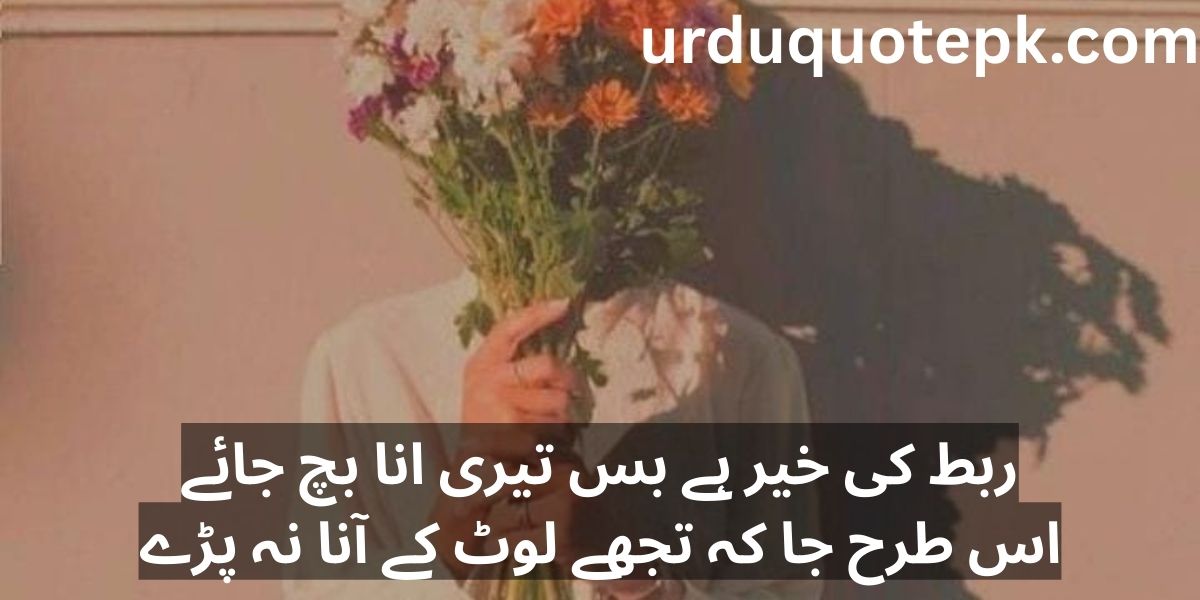
ربط کی خیر ہے بس تیری انا بچ جائے
اس طرح جا کہ تجھے لوٹ کے آنا نہ پڑے
Rabt ki khair hai bas teri ana bach jaye
Is tarah ja ke tujhe laut ke aana na pade
Translation:
May our bond be safe, but let your pride remain,
Leave in a way that you never have to return.
Reflection:
This shayari speaks of letting go with dignity, wishing for the other’s pride to stay intact even as the heart aches for their departure.
Aesthetic Image: A path winding into a foggy forest, with footprints fading away.
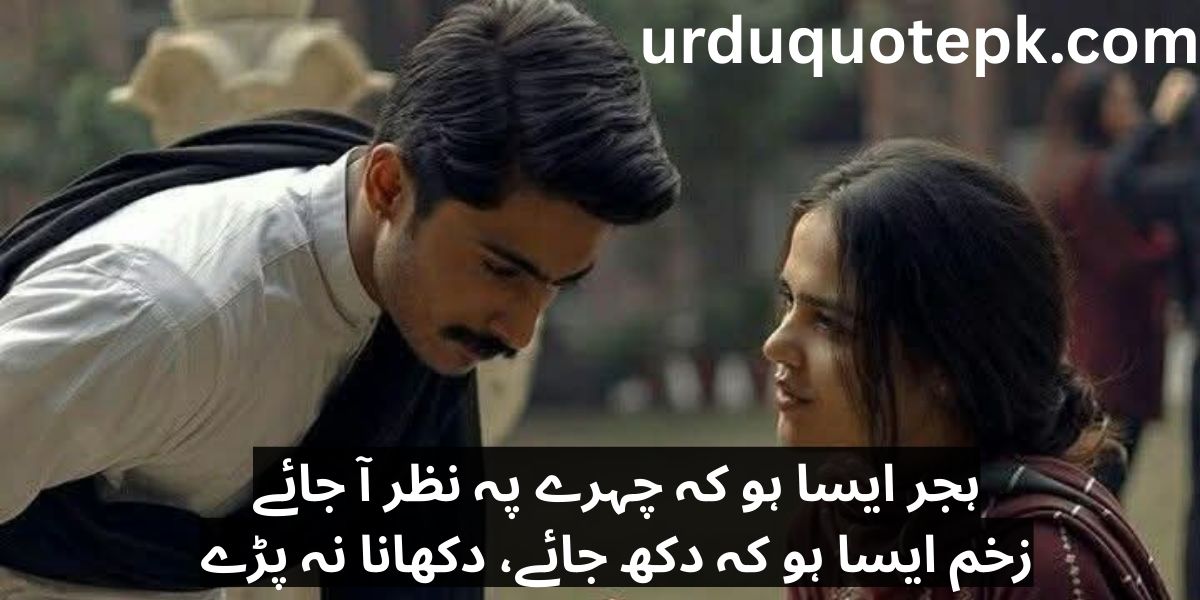
ہجر ایسا ہو کہ چہرے پہ نظر آ جائے
زخم ایسا ہو کہ دکھ جائے، دکھانا نہ پڑے
Hijr aisa ho ke chehre pe nazar a jaye
Zakhm aisa ho ke dikh jaye, dikhana na pade
Translation:
Let separation show on the face,
Let the wound be visible without needing to be shown.
Reflection:
This verse yearns for pain to be so evident that it speaks for itself, sparing the heart the burden of explaining its sorrow.
Aesthetic Image: A tear-streaked face illuminated by moonlight.
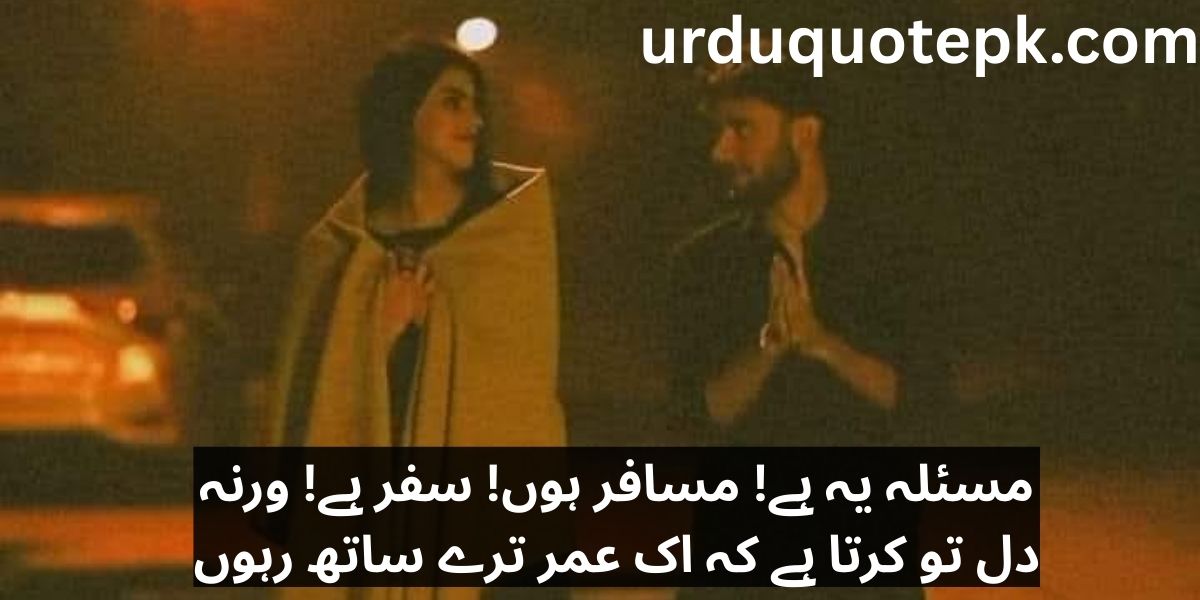
مسئلہ یہ ہے! مسافر ہوں! سفر ہے! ورنہ
دل تو کرتا ہے کہ اک عمر ترے ساتھ رہوں
Masla yeh hai! Musafir hoon! Safar hai! Warna
Dil to karta hai ke ek umr tere saath rahoon
Translation:
The problem is, I’m a traveler, bound by a journey! Otherwise,
My heart longs to spend a lifetime with you.
Reflection:
This shayari conveys the conflict between destiny and desire, where the heart craves closeness but life pulls one away.
Aesthetic Image: A train departing from a station at dusk, with a figure waving goodbye.
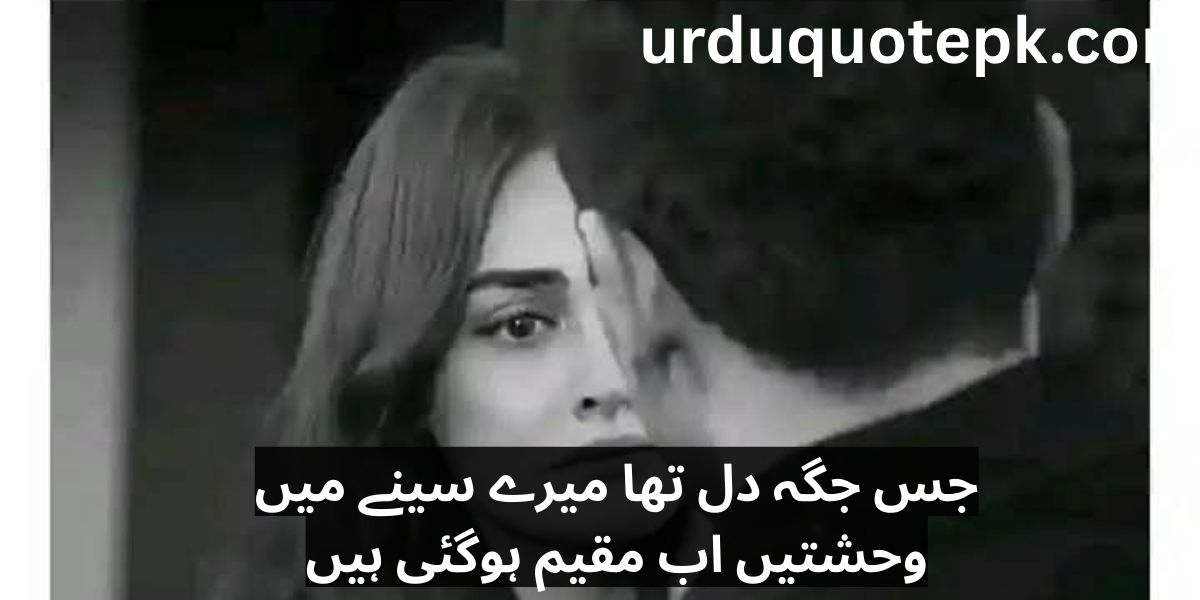
جس جگہ دل تھا میرے سینے میں
وحشتیں اب مقیم ہوگئی ہیں
Jis jagah dil tha mere seene mein
Wahshatein ab muqeem ho gayi hain
Translation:
Where my heart once was in my chest,
Now only desolation resides.
Reflection:
A stark portrayal of emotional ruin, this shayari describes a heart replaced by emptiness after loss or betrayal.
Aesthetic Image: A wilted flower pressed between the pages of an old diary.
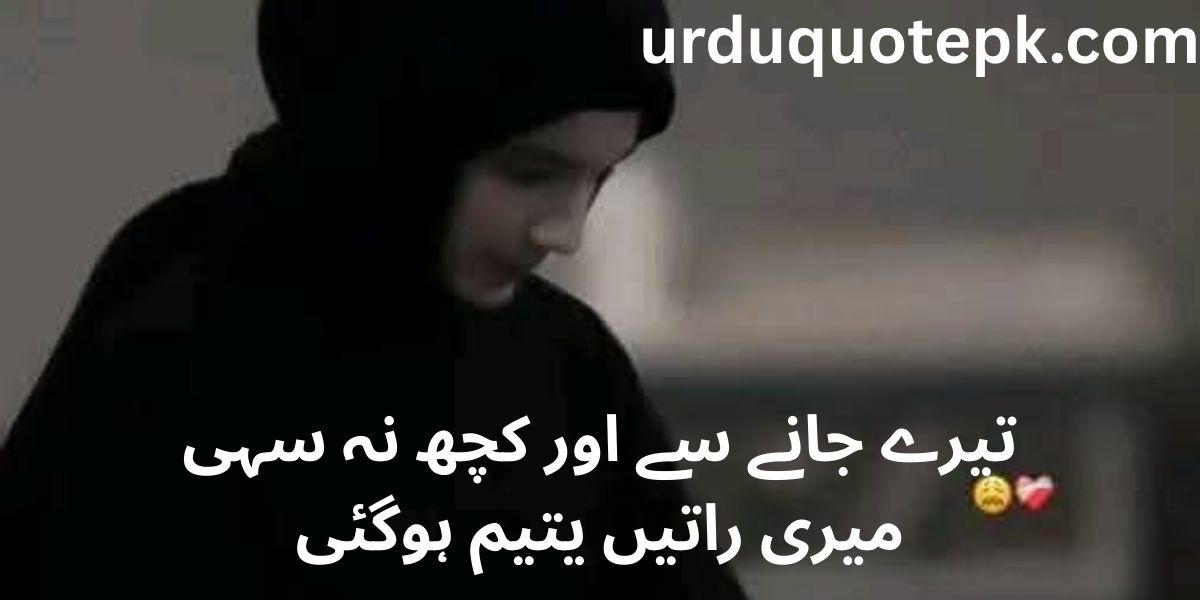
تیرے جانے سے اور کچھ نہ سہی
میری راتیں یتیم ہوگئی
Tere jaane se aur kuch na sahi
Meri raatein yateem ho gayi
Translation:
If nothing else, since you left,
My nights have become orphaned.
Reflection:
This shayari paints the loneliness of sleepless nights, bereft of the comfort a loved one once brought.
Aesthetic Image: A dark bedroom with an empty pillow under a pale moon’s glow.
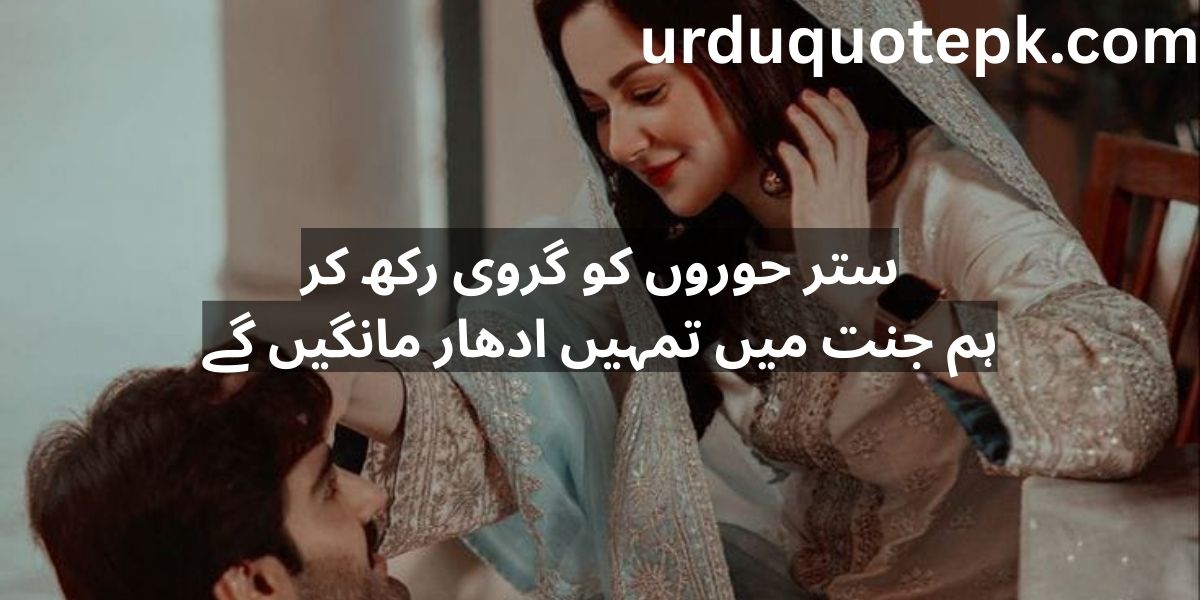
ستر حوروں کو گروی رکھ کر
ہم جنت میں تمہیں ادھار مانگیں گے
Sattar hooroon ko girvi rakh kar
Hum jannat mein tumhein udhaar maangein ge
Translation:
Pawning seventy houris,
We’ll borrow you in paradise.
Reflection:
A desperate yet poetic vow, this shayari imagines sacrificing heavenly rewards for the chance to be with the beloved, even in the afterlife.
Aesthetic Image: A golden sky with ethereal clouds and a single glowing star.
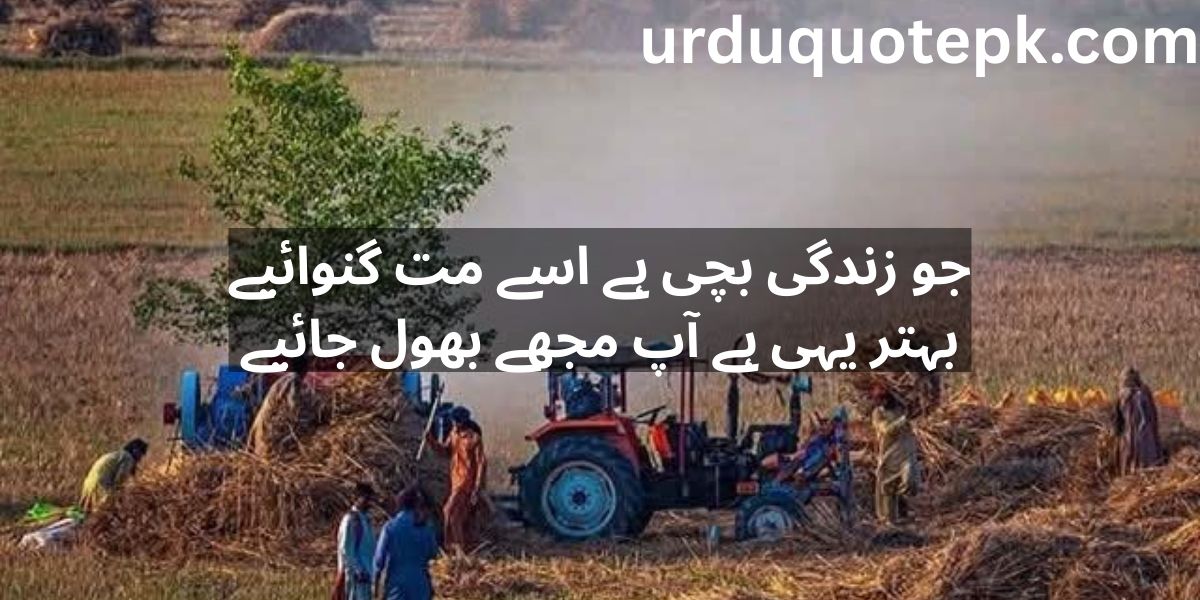
جو زندگی بچی ہے اسے مت گنوائیے
بہتر یہی ہے آپ مجھے بھول جائیے
Jo zindagi bachi hai usey mat ganwaiye
Behtar yahi hai aap mujhe bhool jaiye
Translation:
Don’t waste the life you have left,
It’s better if you forget me.
Reflection:
This selfless plea hides deep pain, urging the beloved to move on for their own sake, even at the cost of the speaker’s heart.
Aesthetic Image: A letter half-written, with ink smudged by tears.
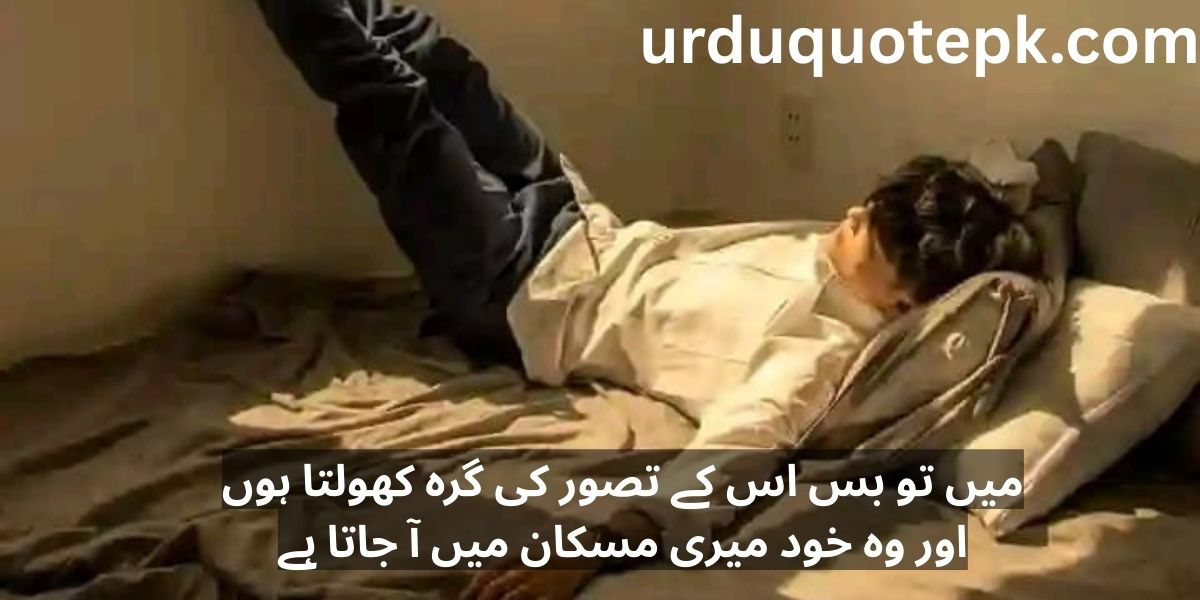
میں تو بس اس کے تصور کی گرہ کھولتا ہوں
اور وہ خود میری مسکان میں آ جاتا ہے
Main to bas us ke tasawwur ki girah kholta hoon
Aur woh khud meri muskaan mein aa jata hai
Translation:
I merely untie the knot of their memory,
And they appear in my smile.
Reflection:
This shayari beautifully captures how the mere thought of someone can bring bittersweet joy, blending memory with fleeting happiness.
Aesthetic Image: A soft smile reflected in a raindrop on a windowpane.
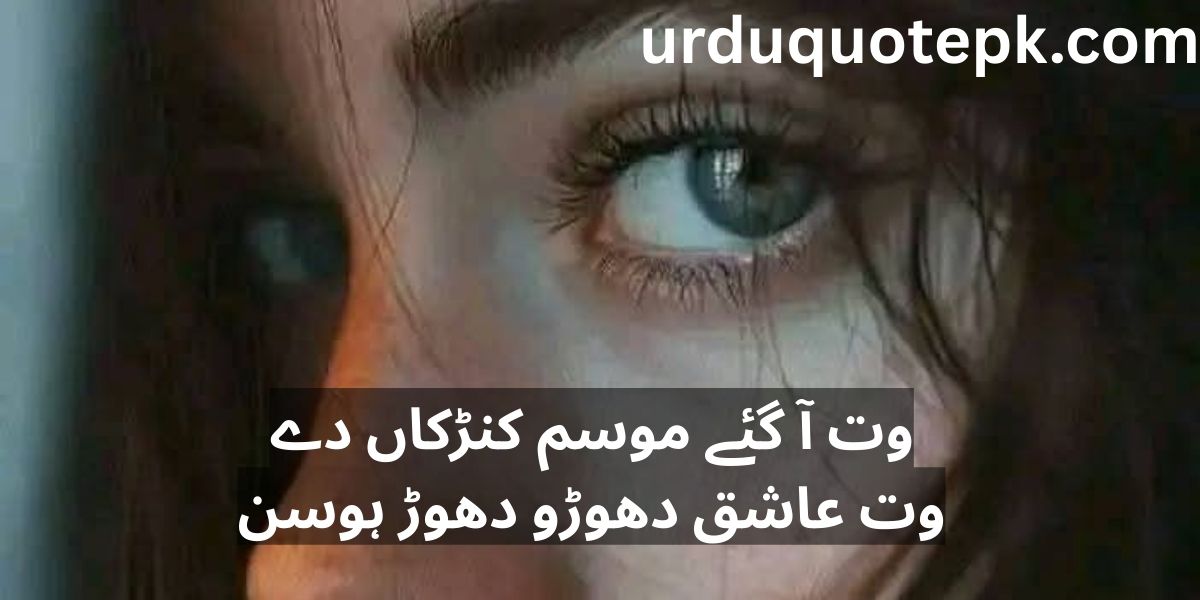
وت آ گئے موسم کنڑکاں دے
وت عاشق دھوڑو دھوڑ ہوسن
Watt aa gaye mausam kanrkaan de
Watt aashiq dhooro dhoor hosan
Translation:
The season of thorns has returned,
Lovers turn to dust once again.
Reflection:
Rooted in Punjabi-Urdu imagery, this shayari evokes the cyclical nature of pain, where love leads to inevitable ruin, like dust scattered by harsh winds.
Aesthetic Image: A desert with thorny bushes under a scorching sun.
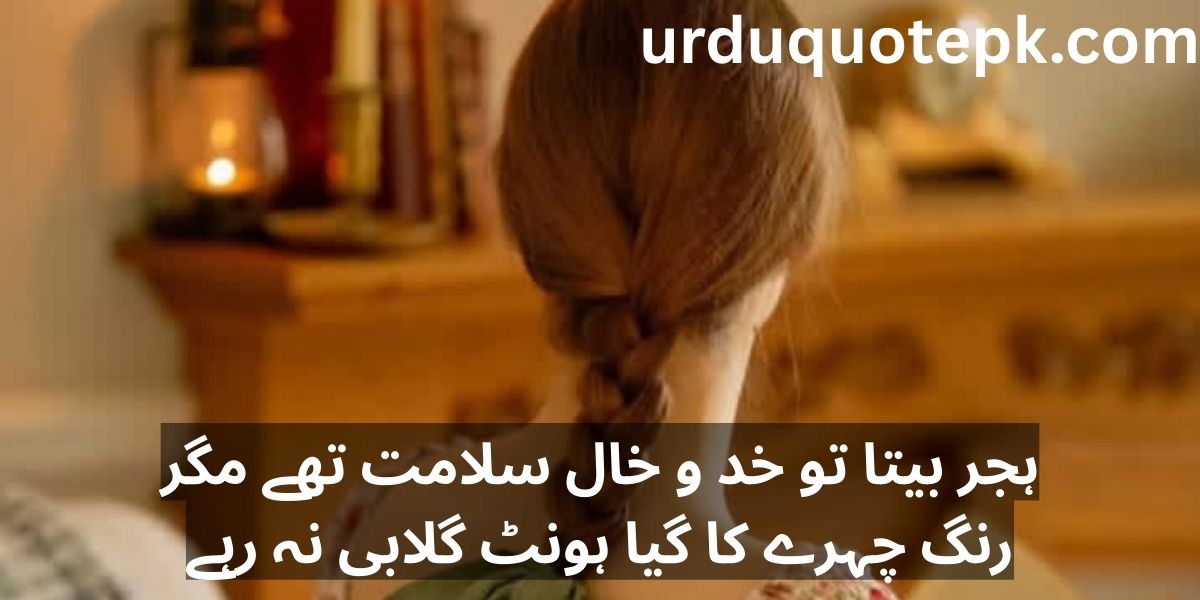
ہجر بیتا تو خد و خال سلامت تھے مگر
رنگ چہرے کا گیا ہونٹ گلابی نہ رہے
Hijr beeta to khud-o-khaal salaamat thay magar
Rang chehre ka gaya, hont gulaabi na rahe
Translation:
Separation passed, my features remained intact, but
The color of my face faded, my lips no longer rosy.
Reflection:
This shayari mourns the toll of absence, where the body survives but the vibrancy of life—its color and warmth—fades away.
Aesthetic Image: A wilted rose with pale petals falling onto a cracked stone.
See Also: urduquotepk.com
Conclusion
These sad Urdu shayari weave a tapestry of longing, loss, and unspoken pain, reminding us that sorrow is a universal thread binding humanity. Each verse is a whisper from the heart, offering solace in shared emotions. Whether you hold them close or share them as statuses on WhatsApp or Facebook, let these words be a bridge to healing, a sign that brighter days await. You’re never alone in your feelings, and these shayari are here to hold your hand through the shadows.

